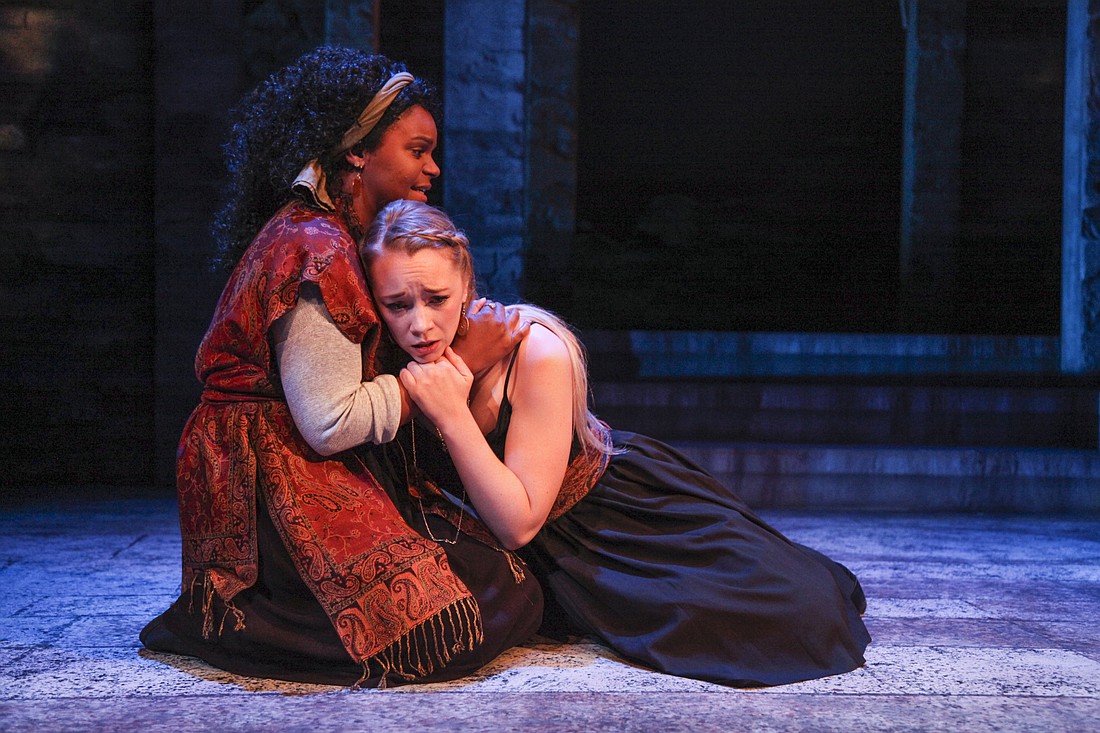- April 2, 2025
-
-
Loading

Loading

Can doing the right thing mean breaking the law? Sophocles’ “Antigone” probes the question in the FSU/Asolo Conservatory’s latest production.
The law is the law. And in ancient Thebes, King Creon’s (Christopher Hayhurst) word is law. After leading his city to victory in a bloody civil war, he declares that traitors can’t be buried. Even making the attempt is a capital offense. But Antigone (Naire Poole) doesn’t care. Both of her brothers were killed in the fighting. One died on the wrong side, but she buries him anyway. As Antigone sees it, she’s defying earthly law to obey the law of the gods. But Creon doesn’t see it that way. He stubbornly insists on carrying out Antigone’s death sentence, even though his councilors, friends, relatives and prophets all know he will bring doom to his house and the city-state if he spills her innocent blood. Everyone but Creon can see it coming. When he finally sees, it’s too late.
Sophocles’ masterpiece drips with awe and terror. It’s a powerful, archetypal drama from an era when theater and religion were conjoined twins. It’s been translated umpteen times, sometimes well, sometimes badly. Jean Anouilh’s version (an Asolo Conservatory production in 2014) was witty, cynical and erudite. Seamus Heaney’s translation has no subtlety or subtext; it’s as direct as a sacrificial knife — and just as sharp. He captures the raw rhythm of the original, with smatterings of coarse, contemporary speech. It isn’t precious or pretty. But it’s terrifying.
Director Greg Leaming lovingly brings the ancient, bloody vision to life. More importantly, he makes it clear. The play’s brutal immediacy can easily overshadow its complexity. It was part of Sophocles’ Theban trilogy, complete with a convoluted backstory and genealogy. (Antigone was one of Oedipus’ daughters, etc.) But Leaming keeps it lucid. You never feel lost.
Hayhurst owns the King Creon character. He does a great job presenting Creon’s side of the drama, and he never feels like a strawman. Poole’s Antigone walks a fine line between helplessness and heroism. Others might praise or damn her choice. Her character doesn’t see it as a choice, and she has no shred of sympathy for anyone who does. That includes her sister, Ismene, who’s movingly portrayed by Anna Beth Baker. Where Antigone is a fearless warrior, Baker’s character thinks twice about dying for a holy principle. Liam O’Brien is also powerful as Haemon, Creon’s son and Antigone’s fiancé. He revolts against sacrificing her for a stupid principle — King Creon’s refusal to admit he was wrong.
Bonita Jackson is bone-chilling as Tiresias, the blind prophet.
The six-member chorus has a job to do, and it’s more than talk. In this production, they’re an elite squad of military professionals, probably King Creon’s security detail. Christopher Blonski, Kenny Fedorko, Alex Rodriguez, Jamie Saunders, Jacob Sefcak and Kaitlyn Weickel sharply convey a sense of martial body language. Even at ease, they’re ready to spring into action at a moment’s notice. On a lighter note, Sefcak is hilarious as the grunt who’s contently tasked with bringing bad news to Creon. He does his duty, but he doesn’t want to be the messenger who gets shot.
Jeffrey Weber’s set reminds me of the setting of Akira Kurosawa’s “Rashomon.” It’s a recently ruined temple. War, not time, has shattered the old order. Alex Pinchin’s sound design evokes a subliminal sense of impending doom. Chris McVicker’s lighting has an equally pitiless quality. Strictly speaking, everything happens outside. Whether lit by sun or moon, it’s all bleak. Sofia Gonzales’ costumes are a brilliant hybrid of past and present. She decks out King Creon in the height of dictator fashion and outfits the chorus in camo. Movement coach Eliza Ladd also supplies the chorus with staves, which they use to stomp rhythmically on the stage floor or thrust and parry in close quarter drills. It’s all very convincing and intimidating. Kudos to the creative team who brings this weird, parallel reality to life.
Like death and taxes, “Antigone” never goes out of style.
Sophocles’ play has a profound universality to it, whatever the translation. Heaney adapted “Antigone” in 2004 at the peak of the second Iraq war. George W. Bush and the follow-the-leader mentality were clearly the late Irish playwright’s targets. That’s all history now. Stripped of its ripped-from-the-headlines reference, “Antigone” is as powerful as ever. There are new leaders, new wars and new deaths. The play’s moral dilemma is ancient, but it never gets old.